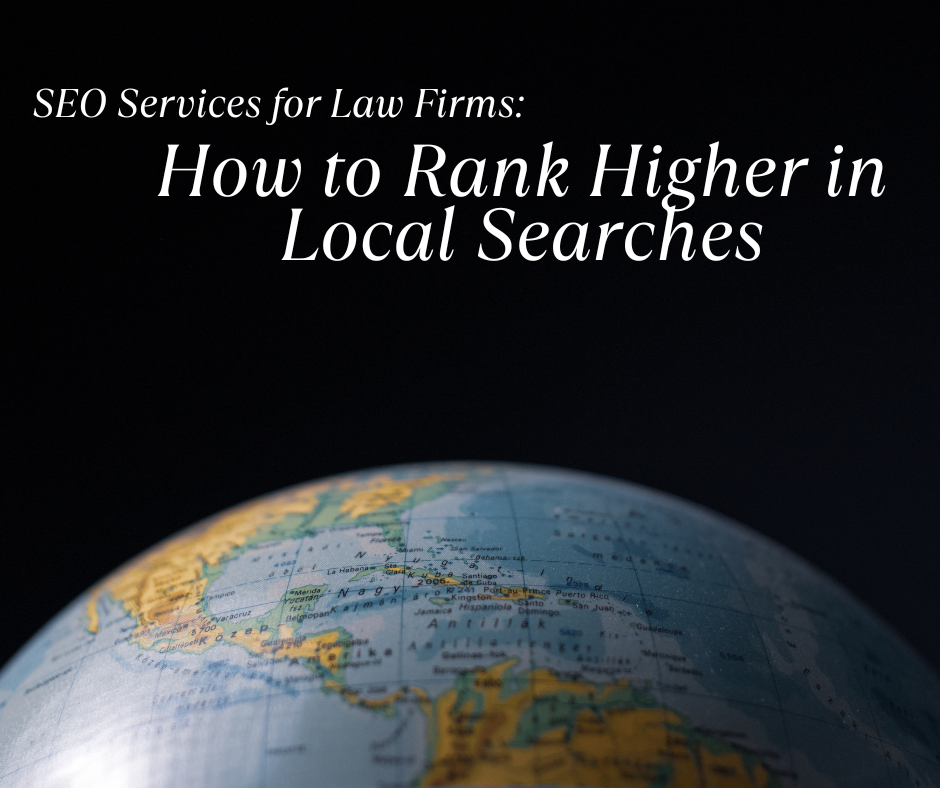SEO Services for Law Firms: How to Rank Higher in Local Searches

Imagine this: Someone in your city just suffered a car accident. They grab their phone and search "car accident lawyer near me." If your law firm doesn’t appear in those top local results, you’ve lost a potential client—possibly forever.
This scenario underscores the critical importance of local SEO for law firms. The digital landscape has revolutionized how clients find legal representation, making online visibility not just an advantage but a necessity. With 96% of legal searches starting online and nearly half including location-specific terms like "near me" or "[City] attorney," local SEO isn’t just another marketing tactic. It’s the cornerstone of your firm’s visibility in the digital age. Firms that master local SEO see up to 400% more views and a 113% increase in client clicks compared to those relying solely on traditional organic search methods.
In this comprehensive guide, we’ll break down actionable, jargon-free strategies designed to help your firm rank higher in local searches and convert more visitors into paying clients. Whether you’re just starting out or looking to refine your existing approach, these proven tactics can make a significant difference.
Why Local SEO Is Non-Negotiable for Law Firms
Clients Are Searching Locally
The landscape of client research has shifted dramatically. Today, 46.5% of prospective clients use search engines like Google to find and evaluate law firms—making it the number one research tool ahead of referrals or directories. This trend is even more pronounced on mobile devices, where searches for “lawyer near me” or “criminal defense attorney in [City]” surpass 600,000 monthly searches. These figures highlight the critical need for your firm to be visible precisely where potential clients are looking.
The Local Pack Dominance
When someone searches for legal services, Google often displays the Local Pack—the map with three business listings—at the top of the results. This feature appears in 93% of local searches and captures 44% of all clicks. To put that into perspective, these top three listings outperform both organic listings (which get about 29% of clicks) and paid advertisements (around 20%).
Securing a spot in the Local Pack can dramatically increase your visibility, leads, and client inquiries. These local results are prioritized because Google aims to provide users with the most relevant, nearby options, making local SEO a powerful tool to dominate your market.
Long-Term ROI
While paid advertising such as Google Ads can generate instant visibility, it often comes with ongoing costs and diminishing returns over time. Conversely, organic local SEO delivers long-lasting results. Law firms that invest consistent effort into local SEO strategies report up to 526% ROI over three years, with a sustained flow of leads that continues long after initial optimizations.
This long-term benefit makes local SEO not just a marketing expense but an investment in your firm’s future growth.
5 Pillars of a Winning Local SEO Strategy

1. Optimize Your Google Business Profile (GBP)
Your Google Business Profile is your firm’s digital storefront. Think of it as your virtual reception area—if it’s optimized correctly, it invites prospects to engage. Here’s how to make the most of it:
Complete Every Section: Ensure every detail, from your firm’s name (exactly as registered) to address, phone number, hours, practice areas, and description, is filled out thoroughly. Use all 750 characters in your description to incorporate relevant keywords like “family lawyer in [City],” but do so naturally. Avoid keyword stuffing, which can be penalized.
Select Precise Categories: Choose specific categories that accurately reflect your services, such as “Personal Injury Attorney” (primary) and “Employment Lawyer” (secondary). Avoid overly broad categories like “Law Firm,” which don’t provide enough detail for Google to distinguish your expertise.
Add Visual Content: High-quality images boost engagement. Firms with 10+ photos see 42% more direction requests and 35% more website clicks. Upload images of your team, office environment, community involvement, and recent events. This humanizes your firm and builds trust.
Manage Reviews: Encourage satisfied clients to leave positive reviews. A firm with a 4.0–4.7-star rating tends to see the best conversion rates, as perfect 5-star ratings sometimes trigger skepticism. Respond to every review within 48 hours, thanking clients and addressing any concerns professionally. Active review management signals to Google and potential clients that your firm cares about reputation and service.
2. Build a Locally-Optimized Website
Your website is your primary hub for converting visitors into clients and reinforcing your local relevance:
Location Pages: Create dedicated pages for each service area—e.g., yourfirm.com/locations/chicago. Incorporate local keywords into titles, headers, and content. Embed Google Maps to show your exact location, and include testimonials from local clients to boost credibility.
Local Schema Markup: Implement structured data (schema markup) on your website, specifying your firm’s name, address, phone number, and practice areas. This helps Google understand your geographic focus and display rich snippets in search results, such as star ratings and contact info.
Mobile-First Speed: Google prioritizes mobile-friendly sites with fast load times. Use tools like Google PageSpeed Insights to identify and fix issues. Aim for site load times under 3 seconds; slow sites can increase bounce rates by 32% and diminish your rankings.
Clear Calls-to-Action (CTAs): Place clickable phone numbers, contact forms, or chat options on every page. Use action-oriented language like “Get Your Free Consultation Today” to encourage visitors to take the next step.
3. Leverage Local Content and Keywords
Content is king when it comes to local SEO. Creating community-oriented content helps build relevance and authority:
Target Long-Tail Keywords: Instead of broad terms like “divorce lawyer,” focus on specific queries such as “How much does a DUI lawyer cost in Miami?” Long-tail keywords attract high-intent clients and face less competition, increasing your chances of ranking higher.
Publish Localized Content: Write articles about area-specific legal issues like “New York Construction Accident Laws” or community events you sponsor. This not only improves your relevance but also encourages backlinks from local news outlets and directories.
FAQ Pages and Blogs: Address common local questions—e.g., “What is Georgia’s statute of limitations for injury claims?” Regular blogging can increase organic traffic by 65% in six months, establishing your authority and answering client questions proactively.
4. Cultivate Citations and Local Links
Building a network of citations and backlinks is vital for establishing credibility and boosting rankings:
NAP Consistency: Ensure your Name, Address, and Phone number (NAP) are consistent across all directories, including Avvo, Justia, Yelp, and your state’s bar association. Inconsistencies confuse Google, harming your local rankings.
Earn Local Links: Partner with community organizations, sponsor local events, or contribute guest content to local news websites. Links from authoritative domains like .gov or .edu are especially valuable. For example, a link from your city’s official website or university enhances your local authority.
Avoid Paid Link Schemes: Focus on genuine relationship-building rather than buying links, which Google penalizes. White-hat link-building strategies, such as community involvement and content marketing, are sustainable and effective.
5. Track and Refine Performance
Continuous monitoring ensures your efforts yield results:
Local Pack Rankings: Use tools like BrightLocal, SEMrush Local, or Local Falcon to track your position for key keywords like “divorce lawyer [City].” These tools simulate searches from multiple locations, providing a realistic picture of your visibility.
GBP Insights: Review monthly data on calls, directions requests, and website visits originating from your Google Business Profile to measure engagement.
Conversions: Use Google Analytics to track form submissions, phone calls, and online consultations originating from local traffic. Set up goal tracking to measure ROI accurately and identify areas for improvement.
3 Costly Mistakes Law Firms Make (and How to Fix Them)

Ignoring Mobile Users
Over 60% of legal searches occur on smartphones. If your website isn’t mobile-responsive, you’re losing countless potential clients.
Fix: Use Google Search Console and mobile testing tools to audit your site’s usability. Ensure your design adapts seamlessly to different devices, with large clickable buttons and easy-to-read text.
Inconsistent NAP Details
Small discrepancies like “Main St.” versus “Main Street” across directories confuse Google and dilute your local authority.
Fix: Conduct a citation audit using tools like Moz Local or Whitespark. Correct errors and ensure uniform NAP details across all platforms.
Neglecting Reviews
Firms that don’t actively solicit or respond to reviews appear less trustworthy and miss out on social proof.
Fix: Automate review requests via email or SMS after client interactions. Respond promptly and professionally, turning every review into an opportunity to showcase your commitment to client satisfaction.
Real Results: A Case Study
A New Jersey personal injury firm struggled with local visibility despite a strong legal practice. After implementing the outlined strategies—optimizing their GBP, creating location-specific pages, and producing localized content—they achieved remarkable results:
312% increase in organic leads
178% boost in Local Pack visibility
Top 3 rankings for 7 high-value keywords
This success underscores the transformative power of a dedicated local SEO strategy tailored specifically for law firms.
Your Next Steps
Remember, local SEO isn’t a one-time project but an ongoing process. To start improving your firm’s local
Sources & References
Google My Business
BrightLocal Local SEO Tools & Reports/BrightLocal Consumer Review Survey
Moz Local & Moz's Local Search Ranking Factors
Whitespark Citation Building & Local SEO Resources
Google PageSpeed Insights & Mobile Optimization
Google Search Console
Legal Industry & Local SEO Statistics
NARAL Pro-Choice America (2023): Reports on mobile search behavior
Content Marketing & SEO Best Practices
HubSpot Blog on Local SEO
Reputation Management & Review Strategies
BrightLocal’s Guide to Gathering & Managing Reviews
Case Study Data & Industry Reports
Local SEO Industry Case Studies



